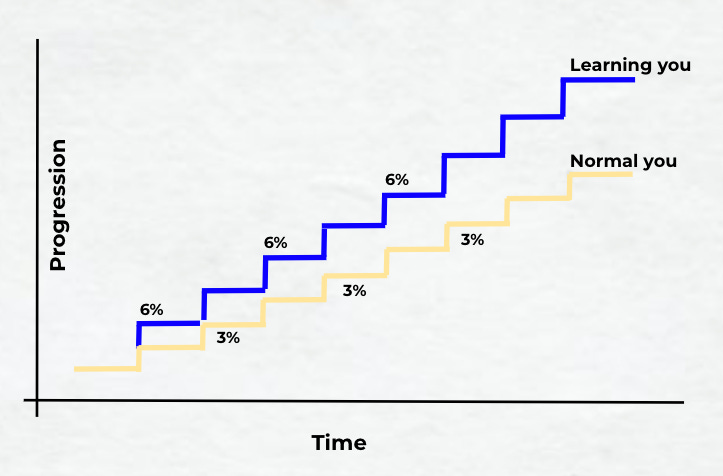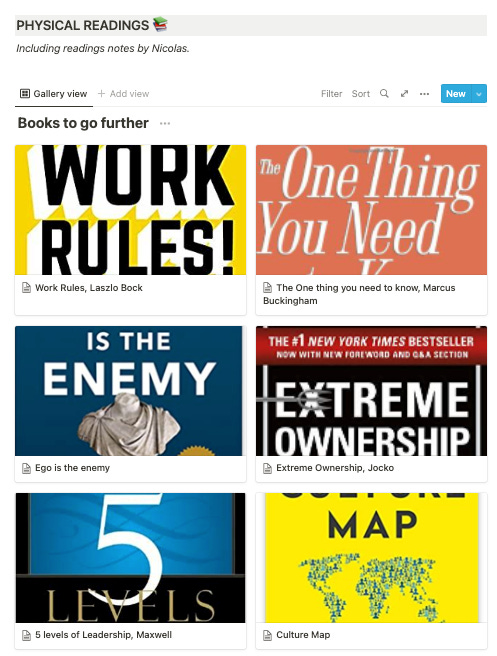Hello there!
In “The Wanderer” newsletter I share some learnings & experiences lived along the way of building a tech company and meeting great people. It does not constitute in any manner universal truths, far from it, but more methods, ideas & thought-processes that can broaden your own perspectives when approaching your day-to-day challenges, help you advance on your goals and live a better life.
If you are not subscribed yet, it's right here!
If you like it, please share it on social networks!
💡 Everyday Learning
With personal and professional ever-growing imperatives it can be tough to dedicate time to learn new things.
This is the situation a very busy friend described to me when we met last week. He asked me if I had some tips to be a more effective learner. Indeed he could not find enough time to read the newsletters he was following to nor going through the pile of business books sitting on his nightstand!
I’m a personal advocate of adopting what is called a growth mindset. I believe learning is one easy way to identify areas you enjoy spending time on:
“What are you attracted to? What areas are you naturally excited by and want to discover more?” These signals are good signals of areas where you can grow a passion.
Today we will discuss (1) the benefits of learning and (2) a few techniques you can use to learn everyday. The world is so vast, so many millions of wise people have lived exciting lives on it, it would be a shame not to learn from them.
I will also share (3) a list of newsletters, youtube channels & podcasts I follow - if you have one you recommend send it over! 👋
Why developing a learning system?
You don’t learn your job at school 🎓
I’ve yet to meet someone in the professional life who learned her/his job at university. University is good for meeting friends and learning how to work. But most schools do not train you for your future jobs. If you have your learning system in place, with time, you can learn anything you need throughout your adult life.
The learning curve is a real thing 📈
First you don’t know what you don’t know. Then you think you know. But you don’t really understand it. Finally you understand it and master it. Learning takes time. Developing an habit is key to not only surface an area you like but go deep into it over time.
Learning can create opportunities down the road 🛣️
You never know how learning something today can help you down the road. I highly recommend having a look at Steve Jobs’s commencement speech at Stanford graduation in 2005 and its “connecting the dots” principle. Demonstrating how understanding calligraphy at one point in his life had an impact later down the road on the Macintosh development.
Learning compounds 🧩
If you learn just a bit week after week, in a few months time you will quickly find yourself in such a different place. 15 minutes when you wake up, during your commute or when you’re back home will make the difference between the Normal You, and the Learning You.
Learning compounds, investing in your learning makes a big difference in progression over time.
Practical Tips to develop your system
1️⃣ Learn your learning style & your favorite content format
Hearing about a topic 🔈, discussing about it 🤝, seeing it in action 👀, writing it down on your notebook or your phone 🖋, having spent years at school we all know what our favorite format & method to learn new things is.
This step is about identifying the format of content (audio, video, reading, writing) that fits best your brain & taste. Optimising for such content will make you more efficient in your learning journey.
For example I used to listen to a lot of podcasts but I realized one day it was tough to remember the specifics once I was done with it. I remembered the high level topic but could not describe what the guest presented in details, his technique, experience or thoughts. Since then I started taking notes while listening. Writing summaries on key passages, with quotes from the guest.
Once you’ve done it, you can go a step further and dive into how your memory muscle works. Usually people have a preferred way for memorising & learning:
(1) Doing-it-yourself style - listening to explanations does not work, you have to practice it to master it. 💪
(2) Seeing-things-done-in-real-life style - seeing someone execute the gesture of preparing a 🥞, observing in action and reproducing it. Videos or audio can work best.
(3) Understanding-the-core-principles style - through teaching or reading for example. 🎓
2️⃣ Build a system around it ⚙️
Now that your understand the benefits of learning, your own learning style & preferred content format you can start building a system to (1) get the information you need (2) store it properly to find it later (the toughest part).
Here are 7 tips you can use to build an effective system:
Your own library system 📚
In the knowledge age we are in we don’t have to know everything top of mind. The world’s wisdom is at our fingerprints through Internet. What is more important though is to be able to find it when we need it. This is why setting up a library & classification system will help you. The tool does not matter and it does not have to be perfect. Documenting it on your phone or a notion online works. What matters is the discipline you have around using the tool. Making the effort to store what you find useful.
Dedicated time for learning in your agenda 📅
At the time in the day where you have the best energy to do so. Personally, in the morning when I wake up, at lunch time and at night before I go to bed. Small bites everyday, not a huge ton at once.
I often do a pre-selection of articles, videos, books and put them on my todo to consume them later when I have a spare time.Push vs. Pull ⬅️
Having the content pushed to you instead of having to pull everything. You can subscribe to newsletters/podcasts, follow people that curate already sorted information in areas of your interest. Another way can be to tell your friends what you’re trying to learn about and they will share content when they find some!Leverage tribal knowledge 🗿
Find experts you’re interested in learning from. Having live conversations will help you learn from existing experience or expertise. We’re lucky to be in an age where a lot (too many?) people share what they know about. We should not be shy and leverage it. People love talking about what they master.One step at the time ✔️
What matters is to be consistent, not to overload yourself the first week and stop after. Small steps everyday will make you go a long way.The Feynman technic 🗣️
“If you cannot explain it simply, you don’t really understand it”. This is the idea of teaching to learn. Pushing you to get to a true understanding instead of just surfacing it. Side bonus: you will remember the learning just by thinking back over the great conversation & moment you had with your friend.Use Retrospective ✍️
Making “retrospective” notes, also called “post-mortem” notes, helps sediment your own experience. Writing what you realize went well or badly will enable you to draw lessons. Sharing it can once again with others is the 🍒 on the cake.
Here is a screenshot of one library of Books & Reading notes I built on a simple Notion page. I have the same system for Conversations with people where I summarize the takeaways (ex: Conversation with X - 21/04/19). I’m also creating one empty note every 2 weeks where I store newsletters, podcasts, videos with main ideas (ex: Week 18/04-25/04 - Dropbox-story//product roadmap detours//aviation industry carbon impact) - keywords in the title can help you find what’s inside months after).
Some newsletters, youtube channels, podcasts I follow 👈
They often produce weekly content. I skip the ones that don’t resonate with me right now. And can keep it for later or share it with people I think could leverage it.
Newsletters 📰
AVC by Fred Wilson - from NY 🗽 (since 2003!)
TomTunguz by Tomasz Tunguz
CBInsights - about startup news
BVP - Bessemer Venture partners, about startup news & playbooks
FirstRound review - startup stories & playbooks
NFX - good VC firm newsletter about SaaS, Marketplaces, Network effects
Every - a bundle of newsletters to discover about anything you want
Waitbutwhy - for people that like longer posts 👀
Dror Poleg - sharing analysis & predictions around technologies
The Generalist - if you like company stories unpacking 👀
Hiten Shah - great curator of content 👀
John Dick, what we’re seeing - funny statistics on various topics
Lenny’s newsletter - about product
SVPG, Silicon Valley Product group, by Marty Cagan - about product
Kevan Lee - about marketing
Edwin Abl - about marketing & leadership
Technically - technical software stuff for non-technical people 👀
Saastr by Jason Lemkins - Go-to-market strategies for SaaS companies & company building
Snowball, one of the rare good French one, on personal finance - cool project to develop your financial freedom ❄️
Youtube channels & podcasts ▶️🎙
Master of Scale by Reid Hoffman (Linkedin founder)
Invest like the best - on startups, with good portraits of entrepreneurs
Vox conversations by former US journalists on various topics
Business wars - business stories in an entertaining format (Ebay vs. Paypal is my favorite one)
Wendover productions - very cool videos about various topics! 👀
Feenvesting - about financial freedom
and of course Simon Sinek youtube channel!
Habits are not built overnight. You don’t need the perfect set up to start, you just need to start somewhere. With an effective system in place you can start wandering the world and learn a lot more than you think you can.
To go further for those who like him, you can watch here what Elon Musk thinks about learning: “basically read a lot of books and talk to a lot of people”.
Happy learning!
— Nico




